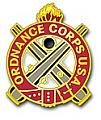Both at all times but frequently one must be temporarily subjugated to the other...
I for one do not either second or object to the premise. It has merit and much truth but it is merely one way to describe the problem. Others will say that one who cannot manage time or comms is inefficient, ineffective, poorly trained or not a good leader -- all those comments are also true.
Sadly, regardless of the attitude of the United States Army Human Resources Command, not everyone of equal educational attainment and broadly similar professional background can do both those things adequately -- much less well...
In our quest for personal excellence, we often forget the fact that the US Army and our friends in other services are not optimum combat forces. They are by design, adequate (barely, some say...) forces for employment on nationally directed missions one of which may be combat. Democracies do not want their armed forces to be too competent. Won't tolerate that, in fact. Our armed forces are products of 200 plus years of evolution and ever increasing bureaucratic sclerosis subject to the whims and vagaries of Congress. They have antiquated personnel systems and compensation processes that are absolutely inimical to flexibility and good order (be that led or managed...).
We skimp on training funds and overspend on equipment to compensate for that shortcoming to a degree. As a result of all that, the services are on balance and in fact mostly marginally trained, not too well disciplined and the Army at least has elevated people of relative inexperience and mediocre competence to positions as leaders, commanders or staff persons with which a number cannot cope effectively.. A mentality that says SFCs or CPTs must be in SFC or CPT positions, regardless of knowledges, skills and ability promotes people to check boxes and fill holes (a dogma that drives many good SSG and LTs out). Personnel management failure on high -- and that is purely a management problem -- leads to all sorts of management problems down the chain. Toleration of that poor management -- at all levels -- is a leadership problem and that absence of leadership is noted and also trickles down the chain.
The position expressed by Michael C. is his take and is certainly correct in many aspects; he's a smart guy -- but I personally think that his two art forms, management and leading are, individually, mild complications and collectively they become IMO excessive complications. Leadership is nothing more than three things -- know your job, do your job and be fair. I submit that management can well be similarly described. So can the old fashioned Army term that encompasses both those and other skills as well -- be tactically and technically competent.
That used to be the goal of all systems, processes, training and PME. That seems to have been discarded. It shows...












 ... but how many serving members (say) under 35 know that?
... but how many serving members (say) under 35 know that?
Bookmarks